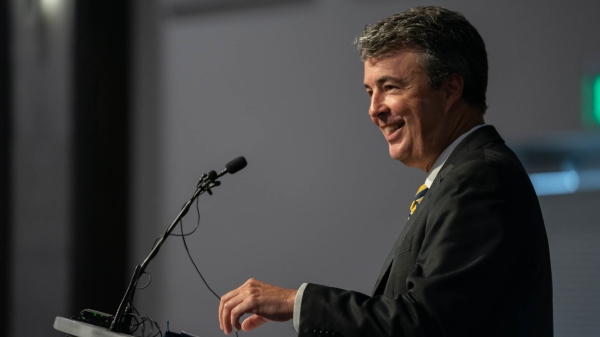|
Getting your Trinity Audio player ready...
|
On Thursday, Attorney General Steve Marshall’s office announced that Marshall had signed onto a complaint against the National Highway Traffic Safety Association over its new fuel economy standards. Twenty-five other states also cosigned the complaint, with Kentucky and West Virginia leading the effort.
The attorneys general’s complaint states that the change to the standards “exceeds the agency’s statutory authority and otherwise is arbitrary, capricious, an abuse of discretion, and not in accordance with law.”
The NHTSA, part of the U.S. Department of Transportation, finalized its revisions to the nation’s Corporate Average Fuel Economy standards early in June.
The finalized revisions to the standards will increase the required mileage for passenger vehicles by 2 percent every year between 2027 and 2032 and the required mileage for light trucks by 2 percent every year between 2029 and 2031.
The NHTSA estimated its standards for passenger cars would require a mileage of 65.1 miles per gallon and its standards for light trucks 45.2 miles per gallon by 2031. However, they also estimated that without the recent rules change the standards would still rise to 58.8 miles per gallon and 42.6 miles per gallon respectively.
Marshall called these changes a “continuation of the Biden Administration’s war against American energy.”
The AG office’s press release claimed they were part of a “forced transition to electric vehicles” and “would bypass the free market while increasing costs on families and undermining the reliability of the electric grid.”
However, according to the NHTSA, people who buy a passenger car or light truck in 2032 will actually save an average of $100 thanks to the change. While the regulatory changes will undeniably increase vehicle prices, the NHTSA says owners will also save significantly on fuel costs.
The total “present value of aggregate monetized net benefits to society” from the changes to passenger car and light truck mileage requirements was estimated to be $35.2 billion.
Additionally, while the AGs’ complaint says the change exceeds the NHTSA’s authority, the NHTSA pointed to its legal requirement to set the “maximum feasible average fuel economy level that the Secretary decides the manufacturers can achieve in that model year.”
The fuel economy standards remained constant during the aughts but between 2010 and 2024 the requirement for passenger cars rose from 27.5 miles per gallon to 54.5 miles per gallon. This was an average annual increase of 5 percent, significantly below the 2 percent increases the NHTSA is currently seeking.
The NHTSA’s altered requirements announced earlier this month are also significantly less stringent than its suggestions last year were.
As one example, in 2023 the NHTSA recommended that manufacturers be required to increase light trucks’ fuel efficiency by 4 percent every year beginning in 2027. Under the new guidelines, light trucks won’t be required to increase their efficiency until 2029, and then only by 2 percent every year.
The American Petroleum Institute, which represents oil and natural gas companies and regularly denies climate change, has also filed a lawsuit against the NHTSA’s changes to its fuel efficiency standards.



















































